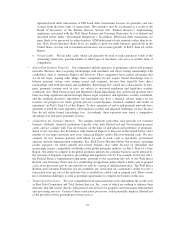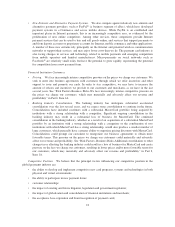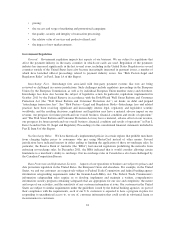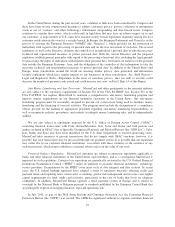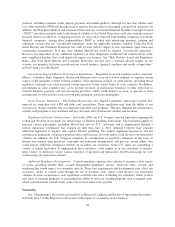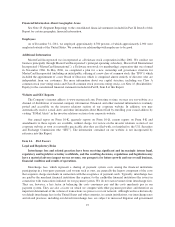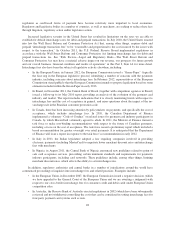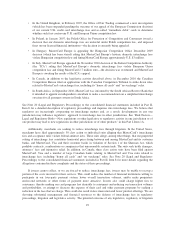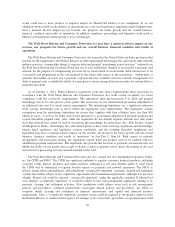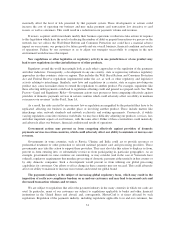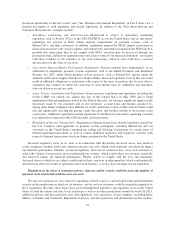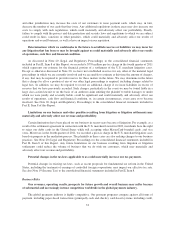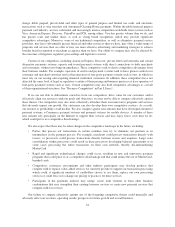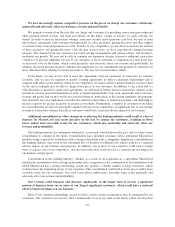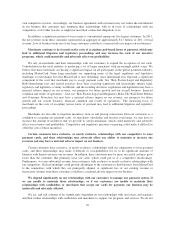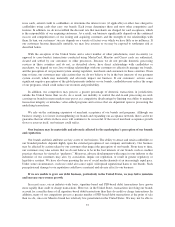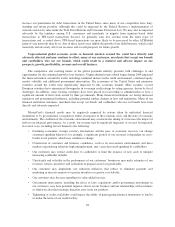MasterCard 2011 Annual Report Download - page 32
Download and view the complete annual report
Please find page 32 of the 2011 MasterCard annual report below. You can navigate through the pages in the report by either clicking on the pages listed below, or by using the keyword search tool below to find specific information within the annual report.regulation as card-based forms of payment have become relatively more important to local economies.
Regulators and legislative bodies in a number of countries, as well as merchants, are seeking to reduce these fees
through litigation, regulatory action and/or legislative action.
Increased legislative scrutiny in the United States has resulted in limitations on the rates we are able to
establish for default interchange rates for debit and prepaid transactions. In July 2010, the United States enacted
into law the Wall Street Reform and Consumer Protection Act that, among other things, requires debit and
prepaid “interchange transaction fees” to be “reasonable and proportional to the cost incurred by the issuer with
respect to the transaction.” In October 2011, the U.S. Federal Reserve Board implemented regulations in
accordance with the Wall Street Reform and Consumer Protection Act limiting interchange fees for debit and
prepaid transactions fee. See “Risk Factors—Legal and Regulatory Risks—The Wall Street Reform and
Consumer Protection Act may have a material adverse impact on our revenue, our prospects for future growth
and our overall business, financial condition and results of operations” in this Part I, Item 1A for more detail.
Interchange fees also have been the subject of legislative activity elsewhere, including:
• In the European Union, in January 2012, the European Commission issued a “Green-Paper” (typically
the first step in the European legislative process) identifying a number of concerns with the payments
industry, including concerns about interchange fees. In February 2012, representatives of the European
Commission stated publicly that the European Commission intends to propose legislation based on some
elements included within the Green Paper in early 2013.
• In Brazil, in December 2011, the Central Bank of Brazil (together with competition agencies in Brazil)
issued a follow-up to its May 2010 report, providing an analysis of the evolution of the payment card
industry and market. The report includes indications that it is closely monitoring trends with respect to
interchange fees and the cost of acceptance in general, and raises questions about the impact of the no-
surcharge rule in the Brazilian consumer protection code.
• In Canada, there has been increasing attention by policymakers on payments, and specifically the cost of
acceptance, which includes interchange fees. In 2010, the Canadian Department of Finance
implemented a voluntary “Code of Conduct” on related issues for payment card industry participants in
Canada, by which MasterCard voluntarily agreed to abide. In 2011, the Minister of Finance formed a
task force to make non-binding recommendations with respect to the future of Canadian payments,
including a focus on the cost of acceptance. The task force issued a preliminary report which included a
broad recommendation for greater oversight over retail payments. It is anticipated that the Department
of Finance will issue a report in response to the task force’s recommendation in early 2012.
• In Italy in 2011, the Italian legislature adopted a law requiring companies involved in providing
electronic payments (including MasterCard) to negotiate lower merchant discount rates and interchange
fees with merchants.
• In Nigeria, in August 2011, the Central Bank of Nigeria announced new guidelines related to point of
sale card acceptance services, prescribing certain minimum standards and requirements for payments
industry participants, including card networks. These guidelines include, among other things, limiting
merchant discount rates, which affects the ability to set interchange rates.
In addition, regulatory authorities and central banks in a number of jurisdictions around the world have
commenced proceedings or inquiries into interchange fees and related practices. Examples include:
• In the European Union, in December 2007, the European Commission issued a negative decision (which
we have appealed to the General Court of the European Union and we are awaiting a judgment) with
respect to our cross-border interchange fees for consumer credit and debit cards under European Union
competition rules.
• In Australia, the Reserve Bank of Australia enacted regulations in 2002 (which have been subsequently
reviewed and not withdrawn) controlling the costs that can be considered in setting interchange fees for
four-party payment card systems such as ours.
28






